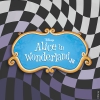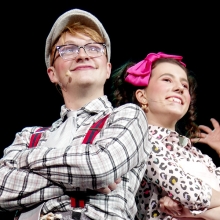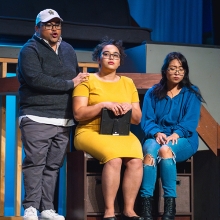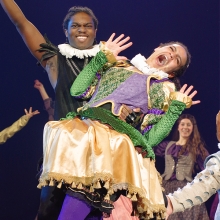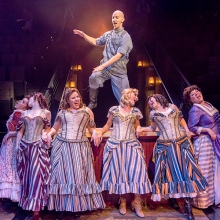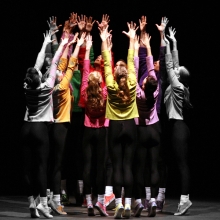Filichia Features: Larry Hochman, The Music Man
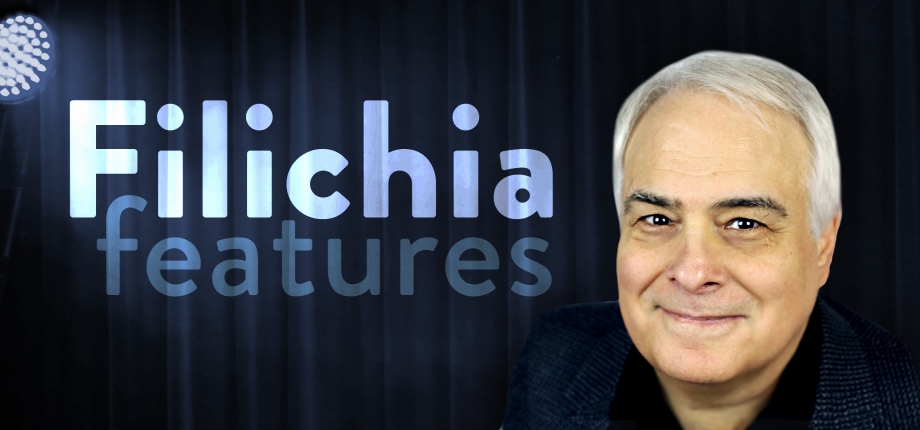
Filichia Features: Larry Hochman, The Music Man
By and large, Drama Desk Awards for Outstanding Orchestrations are bestowed on those music men who chart original musicals and not revivals.
The traditional thinking is that the original orchestrator did the heavy lifting; the one who comes in years later to do the revival has had much of his work already done for him.
So on Sunday, June 5 when the 61st Annual Drama Desk Awards were distributed, Larry Hochman didn’t feel as if he were destined to give an acceptance speech.
Three of the five nominees did new musicals – Bright Star, First Daughter Suite and School of Rock, the last of which had orchestrations by no less than Lord Andrew Lloyd Webber.
Hochman, meanwhile, was nominated for the second Broadway revival of She Loves Me while Joseph Joubert and Catherine Jayes had been tabbed for the first Broadway remounting of The Color Purple.
And yet, Hochman wound up sauntering to the stage to give a heartfelt acceptance speech.
Not bad for a kid who had spent his high school years in Fair Lawn, New Jersey virtually unaware of Broadway. “I was into Peter, Paul and Mary and the Beatles and was busy with school choir and the orchestra,” as Hochman says, ticking them off his fingers.
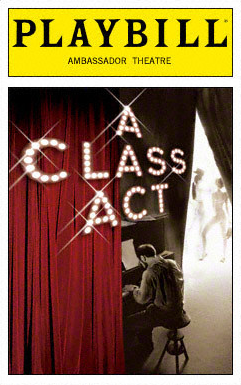
Playbill for A Class Act at the Ambassador Theatre, for which Larry Hochman received his first Tony Nomination.
All Hochman wanted was to be part of the school’s music scene. He even learned to play percussion instruments simply because a senior at the school had seniority over him and was assigned the piano that Hochman had coveted.
Thus until 11th grade, Hochman didn’t know Kismet from Kiss Me, Kate. But one assignment the school’s orchestra annually had was playing for the drama club’s musical. Hence, Hochman was introduced to The Sound of Music. “I was transfixed from the moment I saw the nuns come on,” he says. “I loved playing church bells that sounded as if they came from a distance.”
So when Hochman had the chance to be Music Director in summer stock at The New London Barn Players in New Hampshire, he grabbed it. “My first ‘real jobs’ in '73 and '74 were life-changing experiences.” And so was, he says, discovering Sondheim.
Nevertheless, even after attending The Eastern School of Music & Arts and The Manhattan School of Music, he was surprised to hear about the dynamics of orchestrating a Broadway musical.
“I wasn’t surprised that Gershwin took a full year to orchestrate Porgy and Bess. What astonished me was hearing that Jonathan Tunick,” he says, citing the dean of Broadway orchestrators, “could do charts in five weeks.”Hochman started slowly, just doing the overture for a national tour of A Night with Sigmund Romberg. “Back then, who would have thought that I would eventually be nominated with Jonathan for a 2001 Tony – he for Follies and I for A Class Act.”
Long before the nominations were announced, Hochman saw Tunick at a bus stop and said to him “I hear that you’re reducing the Follies orchestra from 26 to 16. Well, with A Class Act moving from off-Broadway to Broadway, I’m expanding our orchestra – from seven to nine.”
Such is the life of a 21st century Broadway orchestrator. “I like to say that revival orchestrations come in three flavors: vanilla, chocolate and pistachio,” he says blithely. “Vanilla is the original with some changes. Chocolate has the essence of the original with fewer instruments. With pistachio, you filter out as much of the original as you see fit, but you use as much as you want to create a brand new orchestration."
As for his adventures with new musicals: “For Something Rotten!” he says, “I was very pleased when Christian Borle said ‘You know how to stay out of the way of a joke.’ When I did Spamalot, I liked what Mike Nichols said: ‘Music is the ultimate straight man; it doesn’t laugh at the jokes.’”
Another consideration is consideration for the musicians. “For Gotta Dance!” he says, referencing the new musical that’s had a Chicago tryout, “the trumpet player said to me, ‘Were you avoiding me going up here because you thought it would be too high – because I can get that higher note if you want.’ I said ‘Great!’ but, yes, I did write in the lower note because I thought a high F would be too high for him.”

Playbill for She Loves Me at Studio 54 Theatre, Larry Hochman's most recent Tony Nominated show.
And how much, if at all, should synthesizers be used? Says Hochman, “Jonathan does say that it’s not an embarrassment to use synthesizers, for as far back as the Baroque period, harmoniums were used to bolster a small orchestra. But, as he says, a synthesizer is like Hamburger Helper; it can beef up a small meal, but it doesn’t make much of a meal by itself. So She Loves Me uses almost all acoustic instruments, although there are a couple of samples which I’ve buried and camouflaged. I did use synthesizers in Jane Eyre because I wanted the sound of a 30-piece orchestra,” he admits. “More often than not, however, I use acoustic instruments first and avoid synthesizers as much as possible.
“For She Loves Me, I had free rein to do anything I wanted with Don Walker’s original orchestrations. I actually only had Jerry Bock’s original piano parts, so I listened to Walker’s work on Spotify – and then quickly forgot about it so I could proceed objectively with a fresh eye.”
(And, presumably, ear.)
Hochman wasn’t surprised that Walker had used an accordion rather than a piano. “I assumed that he felt an accordion would give the flair of Budapest,” he says, citing the show’s locale. “I’ve always felt that a piano provides a neutral color, anyway, and I like to get away from it.”
And yet, Hochman was surprised to later learn the real reason Walker used an accordion: The Eugene O’Neill Theatre, where the show originally played, had too small an orchestra pit to easily accommodate a piano. “So much for what I assumed to be Don’s fondness for the accordion,” Hochman adds.
The O’Neill is where Hochman’s biggest hit has resided for the past five years: The Book of Mormon, for which he and Stephen Oremus won Best Orchestrations Tonys.
It was the first time he won after four previous nominations, but he didn’t necessarily expect to win. “When we started, we all thought it was a small show which might not even be noticed,” he says sincerely. “As we progressed through previews, it felt like a rock concert each night. That didn’t mean, though, that it would translate to Best Orchestrations, especially because we had a small orchestra. Were the Tony voters able to judge the specifics of orchestrations? Did I get the award because it was a popular show? Maybe!” he says spiritedly, before adding with gleaming eyes, “All contributions are gratefully appreciated.”
Like everyone else in the business, Hochman takes awards with a shakerfull of salt. “The musical details I put into Jane Eyre are on a sophisticated, even operatic level. And yet, I wasn’t nominated for that, but for A Class Act. So you never know.” He puts up hands to ward off any potential rebuttal. “Whatever show they want to honor me for, I’m honored.”
Advice? Hochman gives an I’m-ready nod and off he goes. “It’s all about getting your break AND,” he says, pointing a cautionary finger, “being ready for it. In Beautiful, Carole King promises someone she can do something and then after the person leaves, she says she’s going to go out and get a book to learn how to do it. No! I’m sorry!” he says, sounding not the least bit sorry. “You learn about the traditions. Then you do it in your own way, yes, but not because you’re ignorant of how it has been done. You can get your foot in the door, but it’s up to you to keep the door open. You don’t hit it out of the park out of enthusiasm or energy but with enthusiasm AND energy AND knowledge AND technique AND respect for what you’re doing – not to show how much better you are than anyone else,” he cautions, “but to just give it your most honest try.”
And that’s why “Vanilla Ice Cream” in She Loves Me has a touch of chocolate and pistachio, too.
You may e-mail Peter at pfilichia@aol.com. Check out his weekly column each Monday at www.broadwayselect.com and Tuesday at www.masterworksbroadway.com. His book, The Great Parade: Broadway’s Astonishing, Never-To-Be Forgotten 1963-1964 Season is now available at www.amazon.com.
Share
Callboard
-
Shake and shimmy it with the #Hairspray20Challenge! Join MTI and Broadway Media in celebrating 20 years of #Hairspray. Duet this here or find us on TikTok! Special thanks to @broadwaymedia and @jammyprod. Choreography Guides are a licensor official resource that provides step-by-step instruction from Broadway and professional choreographers for your productions! Visit @broadwaymedia to learn more. #mtishows #youcantstopthebeat #hairspraymusical #goodmorningbaltimore
View on Instagram









